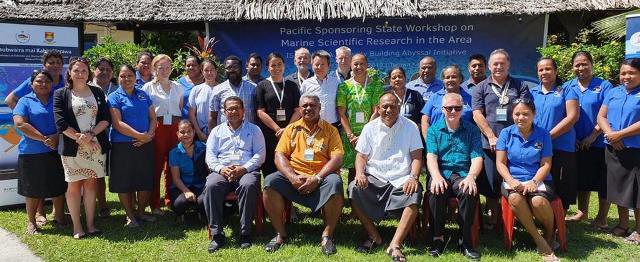P-Sids Regional Training and Capacity Building Workshop : Marine Scientific Research, Kiribati
12 Aug 2019 - 13 Aug 2019
Tarawa, Kiribati
Agenda | Information Note | Participants | Presentations
BACKGROUND
In February 2019, the Pacific Regional Training and Capacity-Building workshop was held in Nuku’alofa, Kingdom of Tonga. Organized by United Nations Department of Economic and Social Affairs (UNDESA) and the International Seabed Authority (ISA) with the support of the Kingdom of Tonga. This workshop had two objectives.
First, to enable participants to deliberate and agree on how participation of P-SIDS could be increased in activities undertaken in the Area and accordingly, to identify what would be necessary to ensure that they fully benefit from such activities.
Second, to clearly identify the main capacity-building needs of Pacific Sponsoring States (Cook Islands, Kiribati, Nauru, Tonga) that are necessary if they want to take full benefit of their participation in activities in the Area with a view to achieving their Blue Economy objectives.
The workshop participants adopted an Outcome document and identified specific capacity-building needs to address gaps and challenges in sponsoring States in the field of marine scientific research. This cover areas of data collection and management, and baseline studies covering a range of physical, oceanographic, biological and existing activities aspects to inform environmental risk and impact assessment, and monitoring and conservation planning.
This workshop in Kiribati is intended to build on this, and develop more specific plans to enhance capacity in MSR.
OBJECTIVES OF THE WORKSHOP
The Regional Training and Capacity Building Workshop on “marine scientific research” held in Tarawa, Kiribati, aimed at bringing two representatives from each P-SIDS sponsoring State. It was anticipated that the workshop would enable participants to gain better understanding of the critical elements relating to the conduct of marine scientific research and how the results of such research can effectively benefit sponsoring States. Additionally, workshop would provide opportunities to further discuss how Sponsoring States can leverage their relationship with contractors to increase their participation in activities in the area (non-monetary benefits) including to support their national objectives.

